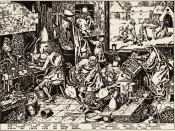In his poem "Ithaca", C. Cavafy tells us that a journey is about the experiences and knowledge gained while travelling towards a destination, which are of greater importance than the destination itself; the latter simply facilitates the journey. This idea of journey relates to P. Coelho's story "The Alchemist" because the book also closely follows this view. In the book, the protagonist, Santiago, discovered that whilst his destination, Egypt, did not hold the treasures that he was searching for, the knowledge he gained on his journey was priceless. In the poem "Ithaca", C. Cavafy tells us that many obstacles on a journey are psychological, brought up by one's own fears and insecurities: he says that determination and positive thinking will get one to one's destination or to achieve one's goal. "The Alchemist" agrees with this philosophy whole-heartedly; in The Old King's own words: "There is only one thing that makes a dream impossible to achieve: the fear of failure."(pg.?)
The book enforces this positive ideology when the Old King says:"When you really want something, all the world conspires in helping you to achieve it."(pg.24)
"Ithaca" tell us that what is learnt on the journey is more important than what is achieved at the destination. This is true for "The Alchemist". Through the character of the Wise King, "The Alchemist" tells us this when the Wise King tells Santiago about the spoon and two drops of oil. "The secret of happiness is to see all the marvels of the world, and never to forget the drops of oil on the spoon"(pg 34). This story says that you have to enjoy your surroundings on your journey - but keep in mind the end that you are trying to achieve. The knowledge that Santiago learnt on his journey in "The Alchemist" was far more important than the treasure he wanted to find because knowledge, once gained, cannot be taken away. Right at the beginning of his quest, when he had barely started, he learnt from the gypsy woman to whom he had promised a tenth of his treasure that everything in life has a price. The Wise King taught him that he should not promise someone something that he didn't have. The King also taught Santiago about the "Principle of Favourability" where there is a force that wants you to achieve your Personal Legend, and that achieving it is one's only real obligation. He taught Santiago that our lives are never controlled by fate, and that despite what some believe, we have the ability to choose our Personal Legends. By the end of the book, Santiago has learnt the truth about alchemy, that it is more than turning metal into gold or finding the elixir to life; an alchemist is a philosopher, and alchemy is a way of thinking. Santiago also discovered that if a person truly loves one, that person will let one achieve their Personal Legend, they will wait. He learnt that you must listen to your heart and he learnt how to become the wind by becoming part of the Soul of the World.
In "the Alchemist" an important message which followed the ideas of "Ithaca" was that if one wanted something enough, was determined enough and thought positively, one would achieve it; any obstacle on one's path can be brushed aside if one does not let fear or any insecurities get to one. The Wise King said: "Don't forget to follow your Personal Legend through to its conclusion."(pg. 32) At the beginning of his journey, Santiago gave someone money to help him get to Egypt. This person disappeared, and Santiago realised he had been tricked. He became upset, but then "he realised that he had to choose between thinking of himself as the poor victim of a thief and as an adventurer in quest of his treasure," (pg.44) Santiago chose the latter, he didn't let the obstacle affect him and he continued. Santiago stopped fearing that he wouldn't achieve his Personal Legend because the Wise King said that this would stop him achieving it; the world would help him to achieve his Personal Legend if he believed he could. When he decided he would persist in his quest, Santiago went to look for work so that he could earn enough money to get to Egypt. He worked for a crystal merchant for a year, but after being told that his salary would not even be close to the amount required to go to Egypt, Santiago again had the chance to give up. He decided to use the money he had earned to buy lots of sheep and return to Andalusia with pride. However when he thought about this again, he didn't feel comfortable with the idea. Santiago could become a shepherd whenever he wanted - he already had the skills - but he wouldn't always be able to achieve his dream of going to Egypt. Santiago remembered that the crystal merchant's suppliers transported crystal through the desert, so he took his first opportunity to find them and see if he could join them with what money he had. Once he had joined the caravan to go through the desert, Santiago understood that "the closer one gets to realising his Personal Legend, the more that Personal Legend becomes his true reason for being."(pg. 74).
In conclusion, C. Cavafy tells us in his poem "Ithaca" that a journey is more important than the destination because it is on the journey that you experience new things and gain knowledge. The destination is important only in that it is your eventual goal and it allows the journey to take place. This idea of Cavafy is closely related to P. Coelho's idea of what a journey is in his story "The Alchemist". Santiago, the book's main character, discovered that what he had learnt on the way to Egypt was more valuable than the treasures that he had hoped to find there. In fact Egypt did not have the treasure he was searching for - it was back at home. In the poem "Ithaca", C. Cavafy informs us that many obstacles on a journey are brought up by ourselves. With determination and positive thinking we will achieve our goals with minimal obstacles. "The Alchemist" saw eye-to-eye with "Ithaca" on this point also because the book enforces that you should never give up. Only the fear of failure will prevent you from achieving what you want, and if you think positively the world will help you to achieve it.


